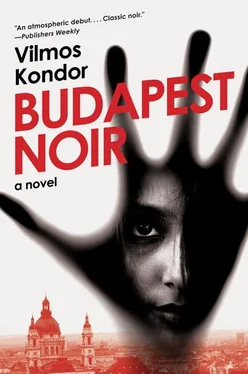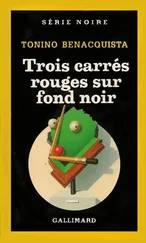“Go ahead and dig.”
“It’s not just urgent, but important, too.” Gordon leaned over Strasser’s desk, reached inside the pocket of his blazer, and pulled out the pack of expensive Egyptian cigarettes. The archivist’s eyes sparkled at the sight. He took the pack from Gordon’s hand, gently opened it up, and took out a cigarette. He ran his fingers all along its length to feel the crackling, gave the cigarette a sniff, and produced a box of matches, whereupon he lit the cigarette with boundless pleasure.
“What is it you want, Gordon?”
“I want to know everything there is to know about Szőllősy, the coffee merchant.”
“The owner of Arabia Coffee?”
“Him.”
“Everything?”
“Everything possible.”
“Let me guess,” said Strasser, now giving Gordon a closer look. “You complained to him about his coffee, and in his rage he gave you a good whacking?”
“Something like that,” replied Gordon with a shrug.
The archivist adjusted his elbow guard and visor, pulled out his desk drawer, and removed an enormous book. This was the catalog of catalogs—the heart of the archives, which Strasser alone understood. “Come back at four,” he said, looking up at Gordon.
“Four?”
“You want me to put it in writing?”
“No need, Strasser. Your word is more than enough.”
“If it’s enough, then you can come back by noon. But no earlier.”
“I’ll be here at twelve,” said Gordon, putting on his hat. He pulled the iron door shut behind him carefully lest he should disturb the archivist.
Although everything still hurt, he had an easier time moving about than he’d had the day before. His hand was the worst. The wound on his forehead no longer throbbed with pain, and if he pulled the hat down over his eyes, it even covered the bandage. His mouth was still swollen, true, but it no longer hurt to speak. Since sudden movements sent a sharp pain shooting through his kidneys, well, he didn’t move suddenly. But his hand. He stuck it into the pocket of his coat and tried not to think about it.
Gordon boarded the tram on Blaha Lujza Square. He sat down beside the window and looked out at the city. Pedestrians chilled to the bone trod the morning streets, wearing gloves and turning up their collars. Those who couldn’t afford gloves stuck their hands in their pockets or else warmed them for a few moments by a chestnut vendor’s stove. Ships were moored by Margaret Island, and resolute rowers were out training on the water. There wasn’t a trace of the families that had come out in droves in the balmy days of summer: of children clumsily making their way about on tricycles, of women pushing baby carriages, of men strolling along with folded newspapers wedged under their arms. Occasionally a cab carrying passengers from one of the island’s hotels turned onto the bridge, but Gordon saw no other signs of movement.
He got off at the last stop, Kálmán Szell Square. This was home to the tobacconist’s shop that sold special, foreign cigarettes. And so many other things, too—of course, only to the initiated. Kovách, the tobacconist, was a vigorous, healthy-looking fellow with ruddy cheeks and a meticulously crafted beard and mustache.
“Two packs of the Egyptian, Kovách,” said Gordon by way of greeting. The man reached under the counter and, after rummaging about for a bit, finally produced two packs. “Would you like anything else, Mr. Editor?”
“Not now,” replied Gordon.
“Come now, sir, you don’t even know how much I have here under the counter. Lots and lots of lovely things. Lots.” He stood, came out from behind the counter, and hung the CLOSED sign on the door. Gordon watched him with curiosity, even though he was in a hurry. Kovách disappeared through the door behind the counter, and when he reappeared, he was holding two wooden trays and a willow basket. “Please do take a quick look over these, sir,” he said, now producing his merchandise of uncertain origin. “Here is the new Parker Vacumatic fountain pen,” he began. “Its novelty is that you can see how much ink is in it. Herman Klein, over on Próféta Street, sells another Parker pen, the Major, for eighty pengős, and I sell them for twenty-nine. I’ve got a couple nice Longines and Omega wristwatches, too, and you won’t believe how little I’m selling them for.” Gordon shook his head. “Then I beg you humbly, dear sir, do buy some of these splendid stockings. They go for a whole lot more in the Heilig Stocking Shop, you know. This pair of sheer silk Signorians are just two pengős, and you won’t even guess how low the denier rating is on them. The same thing is three-fifty at Heilig. No? No. I understand. In the back I’ve got a completely new and never before used Orion 44 shortwave radio, and I’m not even asking a lot for it, actually . . .”
“I’ve got to go, Kovách. Besides, I’ve never bought anything from you except cigarettes.”
“That’s true, sir, but you never know when you might have a change of heart.”
“Hope dies last, huh?” Gordon remarked.
“What was that, sir?”
“Never mind.”
Kovách put away his merchandise in no time, then opened the door to let Gordon back out onto the square. In the time he’d been inside the tobacconist’s shop, the square had awoken, too. Trams came and went, a few odd hikers were setting out for the hills even though it was Monday. Newsboys were vying to outshout each other. Women were on their way to the nearby market. Gordon hurried on. He didn’t like being in Buda. For some reason Pest was closer to his heart; there, at least, he felt at home, insofar as this was possible at all.
Having jostled his way through the crowd on Széna Square, he walked into the Buda Castle Coffeehouse. There was quite a hubbub there, too, but this was the one place that Vécsey was willing to have his morning coffee. Gordon was not the only one who knew where to find Leo Vécsey—if not behind a desk in the newsroom of Hungarian Police News , then he sat here in the Buda Castle Coffeehouse writing and translating away. Ever since he was appointed editor of the newspaper two years earlier, he hadn’t written crime news. He’d had enough of that and much preferred editing, which left him time to translate and even write poetry. Despite this, however, he knew more about the city’s crime scene than anyone. He knew all there was to know about con artists, cardsharpers, swindlers, and the cops chasing them down.
Not that they were friends, but they knew each other well, and whenever they’d crossed paths while working on a story, they’d always felt obliged to help each other out. Vécsey respected Gordon for the years he’d spent in America. Gordon couldn’t understand why, but he knew better than to ask. Whenever the question occurred to him, he heard Vécsey’s common refrain: “Zsigmond, what goes on in this country of ours isn’t crime, it’s comedy. You get burglars with names like Duck-Billed Bill, hookers called Danube Doozy. These folks aren’t criminals, they’re dilettantes. It’s a waste of time, really, even to give my opinion when you ask.” He repeated such words often to Gordon, but then invariably proceeded to detail how many people had been shot to death that week in Chicago and how many millions of dollars had been embezzled in New York. Vécsey was always putting down America, which led Gordon to conclude that he would have much preferred to have been a crime reporter for a Chicago newspaper.
“Zsigmond, you sure did step on someone’s toes,” said Vécsey, fixing his deep blue, almost embarrassingly penetrating gaze on Gordon.
“It’s nothing,” said Gordon with a wave of his hand—his left hand. “But, hey, I heard that one of your books was bought in Hollywood.”
Читать дальше
Конец ознакомительного отрывка
Купить книгу












